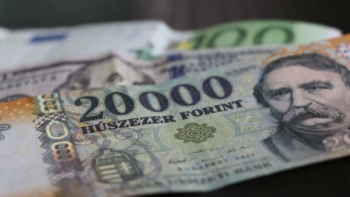EURO will be introduced as a parallel currency in Hungary? Some cities already use it
There are already hundreds of thousands of Hungarians who use the euro as an official currency. Some do not live in Hungary, but tens of thousands have their homes on Hungarian soil. But is it a realistic option for Budapest to introduce the EU’s official currency? And would that be advantageous for the Orbán administration? Below you may find the answers.
As we reported earlier, multiple Hungarian communities are using the euro in their everyday life. Austria introduced the EU currency in 1999, Slovakia in 2004, and Slovenia in 2007. Indigenous Hungarian communities are living in all three countries mentioned. The biggest one is based in Slovakia, with more than 450,000 souls. The Hungarian community living in Croatia adopted the euro on 1 January this year.
However, there are many areas and cities, even in Hungary, where residents, companies, and service providers use the EUR just like the forint. In Sopron and its surroundings, for instance, that is already a daily routine. Hungarians working in Austria receive their salary in euros, while Austrians come to do shopping sprees in Hungary. Therefore, all products are priced in euros as well since it makes everyday business easier.
Zoltán Pogátsa, a renowned Hungarian economist, said that this solution could be adopted in Hungary. It would be advantageous to introduce the euro in Hungary as a parallel currency, Mr Pogátsa argued.
He added that the forint in itself was not in trouble. The Hungarian economy weakens the national currency, he said. Mr Pogátsa added that this was because of Hungary’s considerable energy dependency and the low amount of the foreign currency reserve, index.hu wrote. That is why the forint weakened much more than the Polish zloty or the Czech koruna. Inflation does not depend on the currency a country uses, he explained. For example, the Baltic states also faced skyrocketing inflation despite they have already adopted the euro.
He highlighted that the Hungarian economic policy was wrong and the country should not have replaced the forint only because the Orbán government conducted a faulty economic policy. He added that provided Hungary joined the eurozone, citizens could become disillusioned as it happened after the country’s EU and NATO accession. That is because the euro alone could not solve the country’s economic problems.
According to hvg.hu, Hungary would not be able to introduce the euro now. However, there was an opportunity in the second half of the 2010s to fulfil the Maastricht requirements. But that would have meant the end of the monetary policy of Orbán’s Fidesz. Therefore, the government did nothing to do so. Currently, there is not even a target date for introducing the euro in Hungary. Meanwhile, Bulgaria plans to join the eurozone in 2024.
The Hungarian news outlet argues that joining the eurozone would not mean any advantage for Hungary at this moment. However, it would limit the government’s economic policy and end the autonomous monetary policy. Thus, the euro would result in less freedom for the government. And Orbán would not like that for sure, so Hungary is not likely to introduce the euro in the near future.

Read alsoThe good days did not last long: the weakening of the Hungarian forint
please make a donation here
Hot news
Azerbaijan supplies gas to Hungary for the first time in history
Chinese President to visit Budapest: why is Xi coming to Hungary?
Breaking: Hungarian government to sue Spar
Attention: Budapest-Vienna railway line renovation continues in Hungary, timetable changes
Orbán: Make America Great Again! Make Europe Great Again!
Hungary’s canine favourites: Exploring the top 5 beloved dog breeds




1 Comment
Hello – Traveling to Budapest via Viking River Cruise with a two day extention. May I use Euro’s or do I need HUF’s. I will have credit cards as well.